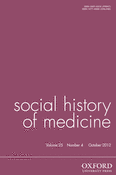-
Views
-
Cite
Cite
Michael Brown, Catherine Kelly, War and the Militarization of British Army Medicine, 1793–1830, Social History of Medicine, Volume 25, Issue 4, October 2012, Pages 910–911, https://doi.org/10.1093/shm/hks076
Close - Share Icon Share
Extract
Catherine Kelly's book forms part of an emergent body of historical scholarship which devotes long overdue consideration to the nature and significance of British military medicine in the late eighteenth and early nineteenth centuries. While the Army Medical Department has its institutional histories (most notably Neil Cantile's A History of the Army Medical Department), it is not until relatively recently that historians have begun to explore the contribution of British military practitioners to the overall stock of medical knowledge or to flesh out that well-worn historical observation that the entry of hundreds of demobilised military practitioners into the civilian marketplace of the later 1810s transformed the structure and politics of contemporary medicine.1 Moreover, unlike another recent text on British army medicine in the Revolutionary and Napoleonic wars (Marcus Ackroyd, et al's, Advancing with the Army) which sought to trace the career paths of military practitioners through an impressive feat of prosopography, War and the Militarization of British Army Medicine attempts something more conceptually ambitious, namely to ‘bridge the gap between histories establishing the effects of foreign service and the experience of war on British medical practitioners, and studies investigating the transition from older forms of knowledge, to “hospital” and empirically-based medicine’ (p. 155).2




